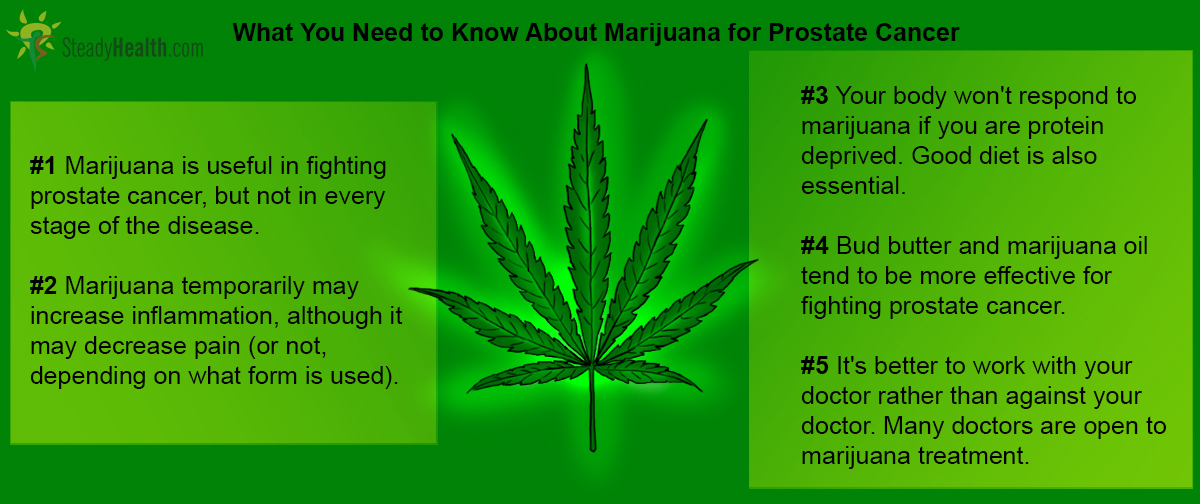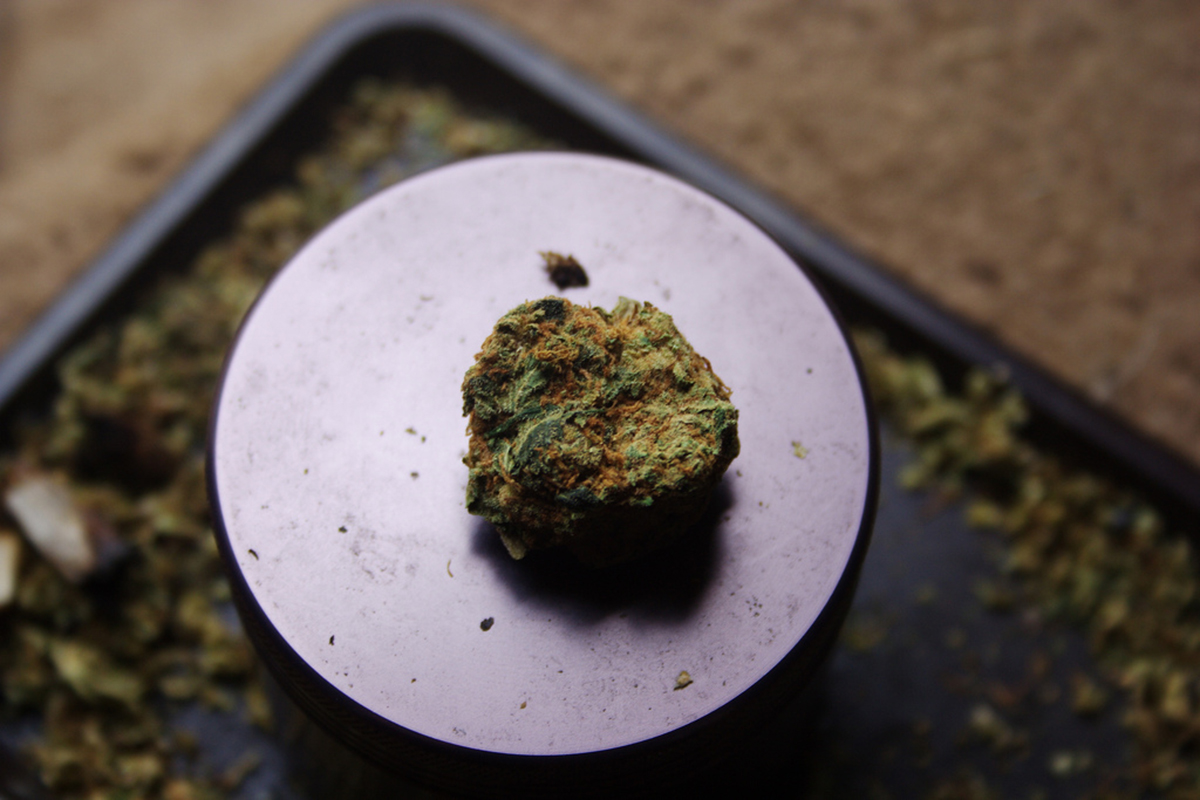At the beginning of any article on medical marijuana, there are a few things we always have to get out of the way.
- We only encourage the use of marijuana where it is legal to use it medically or recreationally.
- We don't sell marijuana, its derivatives, or equipment for making cancer treatments.
- The author, the editor, and the management of SteadyHealth are only interested in making factual information available for people.
Moreover, while marijuana can be surprisingly helpful, the author of this article is not aware of anyone who has gotten well from medical marijuana alone. Marijuana has different effects in different kinds of cancer. This article is about prostate cancer. All of these reservations having been stated, marijuana seems to be very helpful to men battling prostate cancer. It just doesn't necessarily do what you would think.

What's Special About Pot For Prostate Cancer?
When a friend of mine, a former Southern Baptist pastor, was told he had advanced prostate cancer, he asked me where he could get some pot. We happened to be at a wedding reception for a mutual friend who was a banker, and I told him, "Uh, apparently over there by the patio."
It's not hard to find marijuana. It's not especially hard to find an oncologist who will work with you if you choose to use marijuana for prostate cancer. There may be no need to be furtive, secretive, or less than forthright with your doctor and friends in most cases even where pot is against the law. (We cannot give you legal advice for your specific situation.) It is much better to work with your doctor than to keep your experimentation secret, because it is the combination of marijuana and conventional medical treatment that may give you an edge over cancer.
Apoptosis is often explained as "cell suicide". Normally a cell divides at least once to replace itself as it gets old and wears out. Cancer cells multiply wildly and form tumors. Apoptosis "flips a switch" that tells the cell it doesn't need to multiply, and it simply dies. In the case of prostate cancer cells, and not necessarily every other kind of cancer cell, a group of about 60 chemicals known as the endocannabinoids tell a prostate cancer cell to "chill out" and just relax, no need to reproduce itself. Prostate cancer cells even seem to "want" to be told they can live out their life spans without multiplying, in that they develop extra cell receptors for these marijuana chemicals.
Isn't Apoptosis What Marijuana Always Does For Cancer?
It's important to understand that marijuana does not induce apoptosis in every kind of cancer directly. In some kinds of cancers it induces a process known as autophagy, which is essentially the cell eating itself, but not "turning off" reproduction. However, in prostate cancer, the endocannabinoids tell cancer cells to stop producing certain proteins, such as prostate specific antigen (PSA). They become less sensitive to testosterone and to stress hormones.
READ Therapeutic Uses Of Medical Marijuana
What To Expect When Using Marijuana For Prostate Cancer
Killing cancer cells, if you have cancer, is exciting. The mere fact that it is possible to know that something you are doing for yourself to fight back is energizing. However, it's helpful to be realistic about what killing cancer cells involves:
When tissue dies, it has to go somewhere.
After apoptosis results in cell death (a dead cell can't "eat" itself through autophagy), the remains of the cell have to be removed. The way the immune system handles this (if you are paying attention, you will notice that fighting cancer requires a specific kind of immunity) is to send out white blood cells that release inflammatory chemicals to break down the dead cell, and then surround the cell and "eat" it.

Let's think about what that involves:
- Killing cancer is followed by inflammation.
- Inflammation briefly causes tumors to get larger, not smaller.
- The immune system isn't precisely targeted. When it takes out one cancer cell, it may get two or three adjacent cells in the same process.
You might wind up with, say, an stubborn pain in a bone that really is a sign you are getting better, but that may take quite a while to resolve. That doesn't mean, however, that only your immune system's fight against cancer is causing the pain. You need a doctor to work with you so that you get all the treatment you need when you need it.
Diet makes a difference.
The receptors that lock onto marijuana chemicals are made with a group of compounds known as ceramides. Your body needs specific building blocks to make these receptors. One group of compounds the body uses to make ceramides is the amino acid serine. A form of this amino acid known as phosphatidylserine acts as a kind of homing signal for immune system and for the structures that "grab" marijuana chemicals out of the bloodstream.
You can be sure you don't suffer a shortage of the building blocks for these chemicals if you get any of the following in your diet on a regular basis:
- Egg whites (it's OK to eat the yolk with the egg whites).
- Soybean products such as tofu.
- Spirulina.
- Turkey.
- Cold-water fish.
Almost any other high-protein food will do, but if you have trouble getting food down, focus on these if you are also using pot. There are men who don't get enough protein to make marijuana work for them. Simply getting more high-quality protein can be a very easy fix.
The way you use marijuana also makes a difference.
It's more effective to use marijuana oils and marijuana bud butters, because the fat helps the endocannabinoids attach to the surfaces of the cells where they do their work. Sorry, we can't give you recipes for either. That would be crossing some legal lines.
READ What Do We Know About Medical Marijuana?
Keep in mind that even if marijuana works for you, you won't necessarily feel better all the time as you are getting better. Pain and inflammation can even be a sign it is working for you, but you won't know for sure unless your doctor rules out other possibilities in physical examination. Work with a doctor you trust to get best results.
- Cridge BJ, Rosengren RJ. Critical appraisal of the potential use of cannabinoids in cancer management. Cancer Manag Res. 2013 Aug 30
- 5:301-13. doi: 10.2147/CMAR.S36105. eCollection 2013. Review.PMID: 24039449.
- Mimeault M, Pommery N, Wattez N, Bailly C, Hénichart JP. Antiproliferative and apoptotic effects of anandamide in human prostatic cancer cell lines: implication of epidermal growth factor receptor downregulation and ceramide production. Prostate. 2003
- 56(1):1–12.
- Mind map by SteadyHealth.com
- Mind map by SteadyHealth.com
- Photo courtesy of eggrole via Flickr: www.flickr.com/photos/eggrole/4823326716


Your thoughts on this